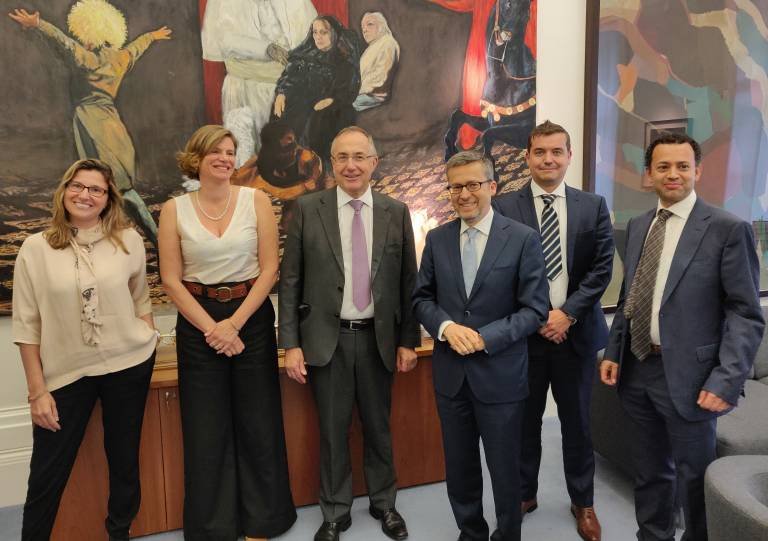European Commissioner Carlos Moedas visits UCL
14 June 2019
Carlos Moedas, Commissioner for Research Science and Innovation at the European Commission, has met with senior academics and leaders during a visit to UCL.

During his visit to London yesterday, Commissioner Moedas held talks with UCL President & Provost Professor Michael Arthur and other senior representatives including leading economist Professor Mariana Mazzucato, founder and director of the UCL Institute for Innovation & Public Purpose (IIPP) and Special Advisor to Commissioner Moedas since 2018. Talks centred around likely priorities for Horizon Europe, the next European Commission, how UK universities can promote closer research collaborations post Brexit and the impact of Plan S on the future of scholarly publishing.
Professor Mazzucato’s work on missions, published in the EC report ‘Mission Oriented Research and Innovation in the European Union’, is a core element of the Horizon Europe research programme positioned around five themes: adapting to climate change; cancer; healthy oceans, seas, coastal and inland waters; smart, climate-neutral cities; and soil health and food. On May 22, IIPP launched a report for the UK Government using the missions framework to steer the UK’s industrial policy.
During the visit, Commissioner Moedas also visited the laboratory of Professor Paul Beard, an ERC Advanced Grant holder. Professor Beard leads the Photoacoustic Imaging Group in the Department of Medical Physics and Biomedical Engineering. The group was one of the early pioneers of photoacoustic imaging and has since grown to be one of the largest worldwide. Dr Aikaterini Fotopoulou, UCL Clinical, Educational and Health Psychology, joined the visit to share her experiences of leading an ERC Starting Grant and her recent Consolidator Grant.
Dr Paul Ayris, Pro-Vice-Provost responsible for co-ordinating Open Science activity across UCL spoke to Commissioner Moedas about the impact of Plan S from Science Europe on the future of scholarly publishing, and the extraordinary success of UCL Press as the UK’s first fully Open Access University Press. Dr Ayris was asked to follow up with the Commissioner on academic concerns regarding Plan S. Whilst UCL academics are supportive of the move to Open Access, the mechanism for that transition has raised significant concern.
UCL is one of the most successful higher education institutions in collaborative research in Europe according to the EC’s own data, published on the Horizon 2020 dashboard. UCL is involved in more than 190 collaborative research projects with funding totalling over €100 million.
The figures show that UCL continues to be an important and influential actor in European research, working with a network of over 3,000 partners across Europe. The figure is also a reflection of the wider success of UK universities in European science, accounting for 5 out of 10 of the most successful higher education institutions in H2020 grants overall.
UCL's success highlights the interdependence of UK and European universities in developing the European Research Area. It also highlights the importance the UKRI underwrite plays as a backstop to secure continuing UK participation in H2020, should the UK not be able to negotiate associate country access as planned.
Although there has been a drop in collaborative bids from UK higher education institutions since the Brexit referendum, UCL continues to perform well and is continuing to promote and target most areas of Horizon 2020 funding and is supporting innovation projects to align with the Commission’s priorities.
UCL President & Provost Professor Michael Arthur said: “As one of the most successful higher education institutions in collaborative research in Europe, UCL is delighted to welcome Commissioner Moedas to London.
“While the UK faces continued uncertainty over our future in Europe post Brexit, we are determined to maintain our close collaborative relationships with world-leading partner institutions across Europe so together we can continue to tackle the biggest global challenges facing humanity.
“More than 200 of our researchers have secured European Research Council funding which is fantastic achievement. Most recently, ERC Advanced Grants for excellence in research were granted to eight of our academics to support them in breaking boundaries and pursuing the innovative projects for which the university is world-renowned.”
Professor Mazzucato added: “It has been an honour to work closely with the European Commission and Commissioner Moedas. Missions provide a way to harness and direct the power of research and innovation, not only to stimulate economic activity and growth, but also to find innovative solutions to the most pressing challenges of our time.”
Links
- UCL Success in European H2020 Collaborative Grants
- Professor Mariana Mazzucato
- EC Report on Missions
- A Mission Oriented UK Industrial Strategy (a report by the UCL Commission for Mission Oriented Innovation and Industrial Strategy)
- Professor Paul Beard
- Dr Aikaterini Fotopoulou
 Close
Close

